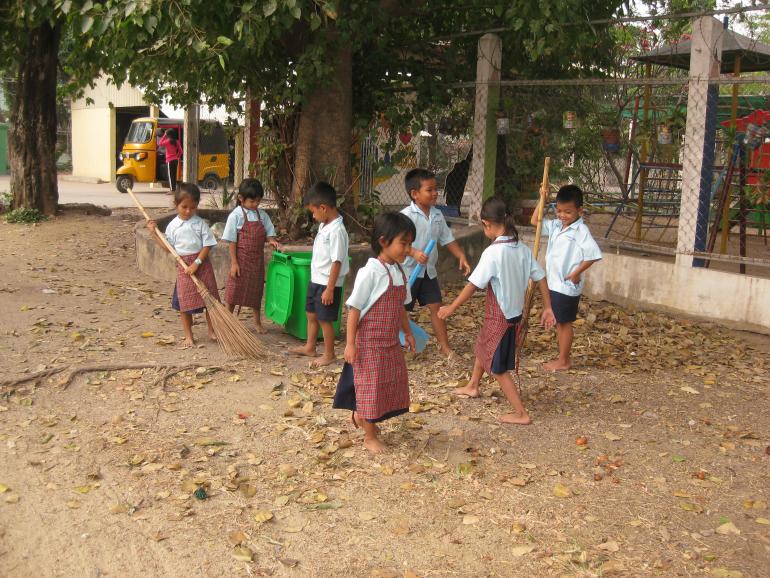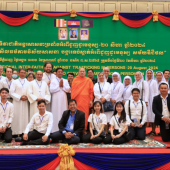Cambodia: Salesian Sisters Launch Advocacy Program for Ecology

Salesian Sisters in Cambodia have launched a program to promote care for the environment. Students, their families and the teachers are involved in a multi-pronged approach to care for ‘our living home.’
The program includes reduced use of plastics, organic farming of vegetables and preparing manure from food waste.
Don Bosco Foundation, which runs four schools in Cambodia, responds to Pope Francis’ call to care for ‘our living home.’ In Cambodia, the Salesian Sisters who run the schools in Teuk Thla, Tuol Kork, Battambang and Phum Chreh have drawn inspiration from Pope Francis’ Encyclical Laudato Si.
In response to the Pope’s call for a “Global Compact on Education” issued in October 2019, the Catholic nuns who work with young people under the banner of Don Bosco Foundation, Cambodia, came up with the project called “Care of Ecology - Our Common Home.”
The project involves the participation of the whole school community comprising Sisters, teachers, students and their parents. Everyone is engaged in learning, planning and implementing, said Sister Teresa Tuale, Principal of Teuk Thla High School.
We prioritized the action plan after a series of seminars, meetings, dialogue sessions. We drew up various programs to tackle the environmental issues of all the Salesian schools and homes of our pupils, she said.
Values of respect, responsibility and care for self, others and the environment are at the heart of the project. The students, teachers and management pledge to say ‘no’ to plastics in any form, be it bags, bottles, or styrofoam, Sister Eng Sarin, Vice Principal of Teuk Thla School, said.
A tri-monthly meeting of the parents helped develop a concrete action plan to reduce plastic and ‘refuse a plastic a day’ in their marketing activities. They also decided to grow vegetables using the organic waste of the kitchen.
The activities included clean-up drives, effective waste management, production of organic manure, reducing, reusing and recycling plastic, promoting bio-degradable carry bags, the wise use of water, electricity and motor vehicles. Students learned how to turn water bottles, food boxes, paper cups, yogurt cups into Christmas decors and other valuable products.
Vandy Lymach, a class tenth standard student at Don Bosco High School Teuk Thla, whose family runs a local convenience store, said. “We still use plastic bags in our store, but we ask each customer whether they need a plastic bag. As a result, today people are aware and the use of plastic bags has reduced drastically in our shop.”
Mueng Eng, a Don Bosco Elementary School teacher at Phum Chreh, testified how she had learned a lot about ecology and care for the environment. Many activities are planned in the school, but we continue to do it also in our own homes.
Parents of the students are delighted to see the active involvement of their children in the project even when they are at home.
Beyond the many activities, ecological values are deepened and reinforced in the students through moral science and value education classes, the Salesian Youth Movement (SYM) activities, and motivational talks.
Lessons from biology and earth science have come out of the textbooks and have become hands-on projects. The students have started to develop kitchen gardens and grow organic food. They have become adept in the disposal of food waste and preparation of vermicompost using natural waste materials like dry leaves, twigs, invasive grass.
The project has helped the students to become more responsible and even earn income by selling vegetables and fruits they cultivate. Some students have donated their earnings to help the needy.
The schools won praise from Cintri, the civic body that handles waste disposal, for the drastic garbage reduction in school premises.
When the pandemic led to the closure of schools and education went online, the students stepped up their activities at home. They have kept themselves busy and active through preparing organic manure and cultivation of fruits and vegetables.
Leang Vuthy, a teacher at the Don Bosco Center, Battambang, remarked how during the covid lockdown “my two children are working hard to plant vegetables around my house, and we often use them for our family.”
Sok Somnang, a class XII student at Don Bosco High School Teuk Thla, said he lives in a crowded urban place with little space for cultivation but keeps five pots in which he cultivates vegetables. He said he feels “happy and good”.
Piseth Bosco, a teacher who heads the environment program at Don Bosco High School Teuk Thla said, “covid has helped me get down to the earth and plant vegetables and rear ducks and chickens for family use. It is very rewarding.”
The school has a theme song to promote the environment: “Sing for the Climate – do it now, now, now and together we can change the world.” The words and the tune of the song are generating hope and enthusiasm among the pupils and fulfilling the dream of the Salesian educative family for a better tomorrow. What we can do now, today we must do it now, says Sister Leeza Kokkat the Director of Teuk Thla high school.
Radio Veritas Asia (RVA), a media platform of the Catholic Church, aims to share Christ. RVA started in 1969 as a continental Catholic radio station to serve Asian countries in their respective local language, thus earning the tag “the Voice of Asian Christianity.” Responding to the emerging context, RVA embraced media platforms to connect with the global Asian audience via its 21 language websites and various social media platforms.














